One of the many great things about the Amish is that their lifestyle is tried, tested, and true. They’ve literally spent centuries mastering the art of living a simple life from what the land gives them. This goes beyond a secretly impressive skill set to include strategies for stockpiling supplies to help them weather just about any situation.
While getting stuck behind one of their horse-drawn carts can be frustrating on the highway, you shouldn’t let that trick you into thinking they’re unwise. You can learn a lot from them, by interpreting what they keep stockpiled and what they don’t.
Commercially Canned, Packaged and Processed Foods
 The Amish never stockpiled canned, pre-packaged, or processed foods from stores. Yet this goes beyond them merely shunning modern technology and convenience. Processed foods and even canned meals have much lower nutrient value than the scratch cooking the Amish live by.
The Amish never stockpiled canned, pre-packaged, or processed foods from stores. Yet this goes beyond them merely shunning modern technology and convenience. Processed foods and even canned meals have much lower nutrient value than the scratch cooking the Amish live by.
If you tried to live completely off canned and pre-processed foods, you’d gradually start to develop vitamin and mineral deficiencies which will impact your health. To prevent this, you’d need to include a daily multivitamin.
Canned and processed foods also tend to have insanely high sodium levels. If you attempt to live off them, you risk things like high blood pressure, kidney damage, and heart disease.
The Amish Alternative
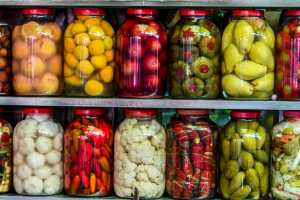 Rather than stockpiling processed foods, the Amish prefer to cook from scratch using fresh, homegrown vegetables, means, and whole-food ingredients.
Rather than stockpiling processed foods, the Amish prefer to cook from scratch using fresh, homegrown vegetables, means, and whole-food ingredients.
That’s not to say that they don’t stockpile food for long-term storage.
Rather the Amish preserve their fruits, vegetables, and other foods with canning, drying/dehydrating, and an artisanal style of fermenting. Natural fermentation in particular is worth learning from them. Not only does it preserve much of the original nutrient value of the food, but it also gives it probiotic qualities. This can improve gut health and even boost the immune system. You can find a lot of useful information in an amazing guide, called The Amish Ways, written by Eddie Swartzentruber, who grew up in an Amish community but left when he was just 17. In this book, he’s opening up about their way of life and sharing their best-kept secrets—simple, natural tips that could make your life so much healthier.
Chemical Cleaning Supplies
Even if they were cheap and easily available to them, the Amish still wouldn’t stockpile commercial cleaning products. This is just as much about the eschewing of modernity as it is about not wanting to introduce chemicals to their very clean lifestyles.
Chemical residue can do more than just smell bad for a few minutes after cleaning the surface. Some can leave behind traces that can transfer to your food or affect your respiratory health.
The Amish Alternative
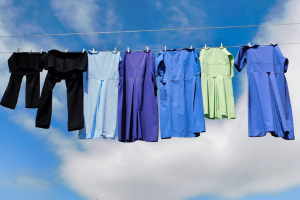 Rather than use commercial cleaning products, the Amish opt for more natural options.
Rather than use commercial cleaning products, the Amish opt for more natural options.
This includes simple, yet very effective cleaning solutions like vinegar and biodegradable homemade soaps.
They will also use baking soda to help clean grime and deodorize certain areas of the home. This might be in tandem with vinegar or mixed with a small amount of water to create a paste.
Related: 15 Survival Foods That Are Better At Amish Stores
Scientifically, the microscopic nucleation sites on the baking soda granules will trap some bacteria, pathogens, and other unwanted organic compounds. Thus cleaning, mildly disinfecting, and deodorizing with an effectiveness near to or better than a lot of chemical-laden cleaning products.
Electronics & Digital Technology
The Amish way of life abstains from electronics and would never stockpile digital technology or the batteries they run on.
For them, this is part of a philosophy that goes deeper than just not wanting to give in to the modernized world.
Deeply rooted within Amish culture is this notion of “Gemeinschaft” which emphasizes the importance of interpersonal relationships, community strength, and mutual support. One could easily argue that modern technology and digital electronics over-emphasize individualism in ways that weaken community bonds.
The Amish Alternative

The Gemeinschaft philosophy that flies in the face of digital technology and modern social media also reinforces the Amish community support network. If someone has a problem, the families around them are quick to help. They don’t need to make an emergency call because they’re all alone with their crisis.
They don’t need to post a want-ad when they want to sell or barter something. They always know someone who needs something they no longer have use for. And they can trust an honest and equal exchange that makes sure no need goes unmet.
They also have a vigorous community sense of entertainment and engagement. This keeps them from being distracted by the latest internet memes or becoming inflamed by a faux pas of words some politician made half a world away.
Jewelry, Affectations, and Fashion Accessories
You might look at the Amish, and their women in particular, and mistakenly think that their plain attire and lack of jewelry is simply due to their humble finances. Yet many Amish families have the financial means to afford these things if they want them.
Related: Amish Long-Lasting Recipes Every Prepper Should Learn
Instead, they don’t stockpile jewelry and other affectations for philosophical reasons. This starts with their religious value of modesty but goes deeper than that. They also believe that showing off physical wealth with jewelry and high-fashion items fosters a sense of envy in others.
The Amish Alternative
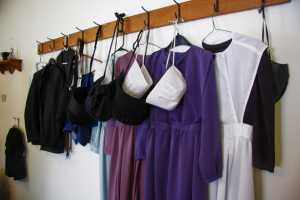 By abstaining from fashion and flaunting jewelry, they create a sense of equanimity between families and community members. This in turn promotes community harmony.
By abstaining from fashion and flaunting jewelry, they create a sense of equanimity between families and community members. This in turn promotes community harmony.
On a more practical level, it also leaves them with more available funds and items to barter for far more important things.
If you were to take this perspective into your own life, think how many more prepping supplies and everyday essentials you could afford if you had less jewelry, wore inexpensive clothes, and drove a simpler car.
OTC & Prescription Medications
While the Amish will use prescription medications when absolutely necessary, they don’t stockpile prescription medications or OTC pharmaceuticals. They are very selective about the use of modern medicines. Yet they aren’t so stubborn that they will refuse them in the face of an acute or severe health issue.
The Amish are very skeptical about the over-use of modern medicines, including most of the OTC medications we consider commonplace. This also includes things like prescription antibiotics and painkillers, which are known to have side effects or a serious risk of dependency.
The Amish Alternative
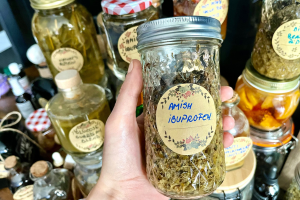 Their reluctance to quickly turn to OTC medications and prescription drugs means that the Amish have a lot of experience with natural or homeopathic remedies. They have a very deep understanding of the use of medicinal herbs.
Their reluctance to quickly turn to OTC medications and prescription drugs means that the Amish have a lot of experience with natural or homeopathic remedies. They have a very deep understanding of the use of medicinal herbs.
This also translates into them knowing how to grow them and store them to always have an available supply. I started to do the same and here is how you can grow your own pesticide-free medicinal plants.
They also have a polished understanding of fever management. The human body produces a fever as a response to a pathogen. This buys the immune system time to defeat the germs in the body, often resulting in a stronger immune system over time.
Our modern strategy for fever management is to use fever reducers, as soon as the slightest fever occurs. This often has a double-whammy effect. Not only does the lack of fever allow the pathogen to spread faster, but it can lead to greater severity when we do develop an illness. Then the fallback alternative is to use prescription medications.
This results in an immune system that becomes increasingly weak over time. It also increases the risks of an individual developing antibiotic resistance, which is something virtually unheard of in Amish society. What you can do instead is start making some of the DIY natural remedies like this Amish Ibuprofen you can make with only five ingredients you probably already have in your pantry.
Electric Hand Tools
The Amish don’t just refuse to stock up on electric hand tools and the batteries that power them because they’re a form of technology. The Ordnung rules that guide Amish life admonish the use of power tools for religious philosophical reasons and practical reasons.
The Amish find such tools imprecise, while also reducing the relationship between the craftsman and the thing they’re working on. The speed and increased risk of errors power tools pose, lead to waste.
A power drill is more likely to make an error when drilling a hole in a board. When this happens, you’re more likely to throw it away. Whereas a carefully chiseled mortise and tenon joint by Amish craftsmen take their time and is create with absolute precision. The board is seldom wasted, and even if it is, the Amish craftsman learns from the error. Thus, being less likely to make it again.
You see this reflected in the high quality of Amish furniture, homes, and barns. It’s reflected in the high prices people are willing to pay for Amish crafts.
The Amish Alternative
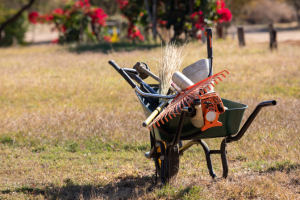 It’s important to note that some Amish communities will use steam-driven tools for bulk work such as steam-powered sawmills.
It’s important to note that some Amish communities will use steam-driven tools for bulk work such as steam-powered sawmills.
However, when it comes to the finer skills involved in carpentry, wood crafting, and home repairs, they always use hand tools.
In terms of prepping, there will come a point in a prolonged disaster where it’s no longer possible to charge power tools. Having high-quality hand tools in your stockpile and knowing how to use them. If you wait until your batteries die to work on these skills, you risk massive setbacks to important projects at a time when you’ll likely have little time to waste. If you want to discover a lot more about being self-sufficient off the grid, these are the 6 Amish “powers” you should master before the next crisis.
Final Thoughts
When you look at some of the things the Amish never stockpile, it starts to make sense. Especially, if your prepping strategy is focused on surviving for years after the fall of modern civilization.
The Amish don’t stockpile canned goods and processed foods. Choosing instead to keep pantries and root cellars filled with their own dried, fermented and canned foods. As a result, their food stores have more nutritional value and less sodium. They also have a strong, practiced skill set that makes it possible for them to sustain their food stores indefinitely.
They also don’t stock up on electronics, power tools and the batteries that support them. Yet this goes beyond eschewing modernity. It helps them invest more in their community, their nearby support systems and their skills.
While the Amish do use modern medicine, when necessary, they never stockpile OTC and prescription drugs. They prefer to rely on their own commonsense medical skills, in ways that often promote a vigorous immune system.
Now, I’m not saying you need to get yourself a straw hat and a pair of suspenders to chuck it all on a reverse rumspringa. However, the next time a horse and buggy slow you down, remember that the person driving it isn’t a backward-thinking moron. If you get a chance to meet them at a fair or Amish store, they might just have something worth sharing.
You may also like:
 Myth or Fact: Can You Really Cook in A Thermos on the Move?
Myth or Fact: Can You Really Cook in A Thermos on the Move?
Why the Amish Never Get Sick (Video)
10 Medicinal Uses Of Alcohol You Can Benefit From Right Now
Pemmican vs. Spam. Which is the best food for survival?
How To Make Survival Lamps With Used Cooking Oil and Mason Jars















i have to disagree with you on a couple points. we are surrounded by amish in webster co. mo. and they very much use power tools in their construction projects and use generators in some of their barns. the reason they have ready cash is that they don,t pay taxes and the steel rimmed wheels do a number on the pavement. a friend of ours owned a store in an omish community and he said liquor sales is what kept his business going. alot of them are very good people but don,t group all amish in this catagory, just like us “english” we’re not all good either. the amish refer to us as “english”. they are also well armed if someone was thinking they don’t use firearms. they’re good customers at the gunshows.
I agree, poot, some groups use more technology than others. I saw an Amish teen pull up to the gas pump with his horse pulling a dray. On the dray were gas-powered weed whackers. I’d just left an ish farm where I bought cheese and eggs. Two girls were using a push mower (no gas, no engine, just wheels and blades model) to cut the lawn by the house.
I’d see them in the grocery store. They’d have pasta or some commercially canned goods in their shopping carts or baskets. While they likely weren’t storing these items by the gross, they did use them.
Where I live now, the Amish are further away. I’ve seen bulletin boards posted in their stores that advertise horses or livestock for sale and other things. English as well as Amish folks patronize the stores.
I do Not like this person’s Negative perspective.. sorry ✌️
Some Amish use no tech, most use some tech and some run around on computerized tractors guided by satellites. The problem with the Amish philosophy is the thought that 19th century technology is okay, but they could live an even simpler close to the earth lifestyle if they limited themselves to 12th century technology, or the tech of the bronze age, or maybe be totally Paleolithic and plow their fields with sticks and stones. Maybe the old SE Asian lifestyle of peasant rice farming where everything is done by hand wearing pajamas with the help of a water buffalo and fertilizer is what comes out of your back end?
I believe the point to take from the article and the comments about the Amish. It doesn’t matter if they use modern. They are still a tight knit community. That will make a difference if or when it all hits the fan.
I understand that if they use technology, such as telephones and power tools, it all depends on the community to which they belong. I remember asking an Amish woman, how do you preserve eggs? She replied that like everyone else in the refrigerator! , they have a life closer to modernity than what people believe.
If we ever get to TEOTWAWKI, the Amish communities will just carry on as if nothing has happened. That’s a good way to live your life, in harmony with earth and God.